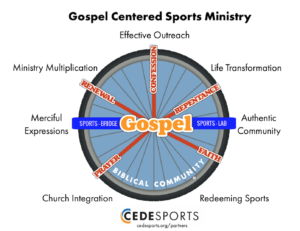[vc_row][vc_column][vc_column_text]
Written by Bob Schindler, Executive Director of CEDE Partners – an Initiative of CEDE Sports
More Congregations are Utilizing SR&F Outreach Ministry*
“Sports ministry in local churches is on the decline.”
I don’t remember when I first heard this assertion, but it has certainly been around for at least the last 10 years, since the Great Recession.
Proponents of this perspective point to the following:
- Churches getting out of sports ministry
- Sports ministries that serve local churches experiencing ongoing decline in the churches using their services
- Denominations reducing their efforts (or even eliminating them) to promote sports ministry
- National efforts to support the sports ministry movement closing their “doors”
While these claims have verifiable data, they represent only part of the picture. Before one can make the assertion that the number of churches doing sports ministry is on the decline there is another piece of the equation we must identify. That is how many churches are getting into sports, rec and fitness during the same time frame considered when discussing churches getting out of it.
Estimations
We can only be certain of this “net effect” when we know both the churches getting out and churches getting into the SRF movement.
While I am not aware of any research to identify this plus number, there are some indicators that provide helpful insights. According to research in 2010
- 36% of all churches have a sports and fitness initiative – either team sports, fitness activities or exercise classes
- That number increased to 40% for evangelical churches
If there are at least 350,000 churches in the USA with a conservative estimate of 80-100,000 of those being evangelical, this means that somewhere between 32,000 evangelical churches and 126,000 overall churches in the USA are involved in the SRF movement!!!
I recognize this is just one data point and doesn’t demonstrate any trend, but I point this out for us to get a better idea of the scale of the churches involved in the SRF movement. When I got involved in the broader SRF movement in 2003, I heard estimates that were in the thousands. Now we have real research that tells us that number is at least in the tens of thousands and may actually get to a hundred thousand.
The estimate – thousands to maybe ten thousand.
The actual – tens of thousands to maybe one hundred thousand.
Encouraging Findings
I was way off in my estimation, and others were way off in theirs as well. I am really astounded, a little humbled and also encouraged by this realization. If this is true, this means there were lots and lots of churches in the US that are doing SRF ministry that no one really knows about.
My own personal experience validated that reality. I have the privilege of traveling and interacting with those in the SRF movement in a number of different regions in the US. In those travels, I regularly run into churches who have been doing SRF ministry for some time yet have no contact with other churches, sports ministry organizations, or broader movement efforts.
Building, Expanding
I also regularly find churches that are getting into SRF ministry, not getting out. Churches that are building gyms/fitness facilities/fields to facilitate that ministry. Churches that are hiring staff to develop that ministry for the first time.
It is true that there are churches getting out of SRF ministry, but there are also churches out there that believe in the power and value of SRF ministry.
Furthermore, if we think about
- The growing interest in fitness and the growing involvement in fitness ministry by churches over the last 10-15 years
- The developing work by churches among immigrants and refugees through sports, rec, and fitness
- The missional efforts of churches to send coaches, parents and players into community sports leagues
It is even possible to imagine a net positive effect on the number of churches involved in SRF ministry.
While there is a need for more specific research on this net effect, with all that I have outlined in in mind, I would ask you to expand your perspective and consider a very different possibility for, a very different picture of, the status of SRF ministry in the USA. I would ask you to look for signs of these encouraging trends. They are all around us. Look around for those churches who are starting SRF ministry or already doing it and who are not connected with other churches or any of the national SRF efforts. Find them and help them get connected.
Lastly, tell others what you find. This different picture gives those of us invested in the SRF movement reasons for real encouragement and hope for the future.
This is the perspective I have adopted and hope you will too. SRF ministry in local churches is on the rise!!!
*I have shared these ideas on several occasions. At Dr. Greg Linville’s request, I wrote this article for his book The Saving of Sports Ministry – The Soteriology of Sports Outreach available here.
[/vc_column_text][/vc_column][/vc_row]
 Bill serves as the Family Activities and Singles Minister at Central in College Station, TX. Q: How did you get connected with CEDE?
Bill serves as the Family Activities and Singles Minister at Central in College Station, TX. Q: How did you get connected with CEDE?

 Q:
Q:  Q: How did you get involved with CEDE Sports?
Q: How did you get involved with CEDE Sports? The Covid 19 pandemic has certainly been tough on sports ministers. Some that I personally work with, have had to take different roads in the ministry of the church such as: media work, “Cares Act” guru helping the church get two or more months of salaries, or facing the reality of being reduced to only part time. Your situation might be similar to these. There are many unanswered questions ahead as we wonder how school is going to happen, and if we can restart our ministries without compromising safety.
The Covid 19 pandemic has certainly been tough on sports ministers. Some that I personally work with, have had to take different roads in the ministry of the church such as: media work, “Cares Act” guru helping the church get two or more months of salaries, or facing the reality of being reduced to only part time. Your situation might be similar to these. There are many unanswered questions ahead as we wonder how school is going to happen, and if we can restart our ministries without compromising safety.
 Ephesians 2:10 says,
Ephesians 2:10 says, 